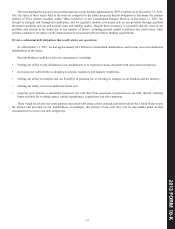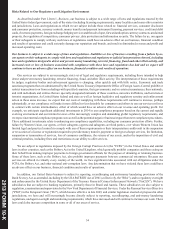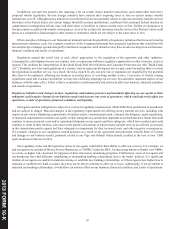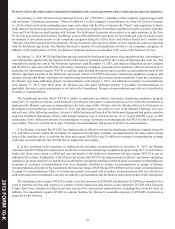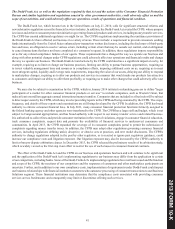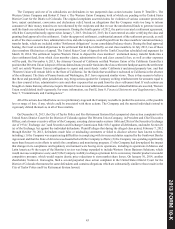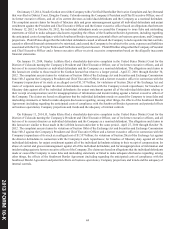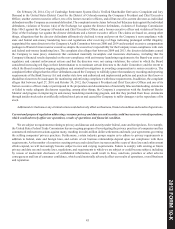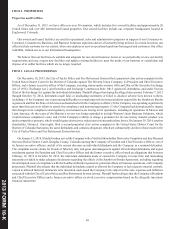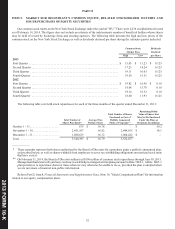Western Union 2013 Annual Report Download - page 153
Download and view the complete annual report
Please find page 153 of the 2013 Western Union annual report below. You can navigate through the pages in the report by either clicking on the pages listed below, or by using the keyword search tool below to find specific information within the annual report.
2013 FORM 10-K
43
The Company and one of its subsidiaries are defendants in two purported class action lawsuits: James P. Tennille v. The
Western Union Company and Robert P. Smet v. The Western Union Company, both of which are pending in the United States
District Court for the District of Colorado. The original complaints asserted claims for violation of various consumer protection
laws, unjust enrichment, conversion and declaratory relief, based on allegations that the Company waits too long to inform
consumers if their money transfers are not redeemed by the recipients and that we use the unredeemed funds to generate income
until the funds are escheated to state governments. During the fourth quarter of 2012, the parties executed a settlement agreement,
which the Court preliminarily approved on January 3, 2013. On June 25, 2013, the Court entered an order certifying the class and
granting final approval to the settlement. Under the approved settlement, a substantial amount of the settlement proceeds, as well
as all of the class counsel’s fees, administrative fees and other expenses, would be paid from the class members' unclaimed money
transfer funds, which are included within "Settlement obligations" in our consolidated balance sheets. During the final approval
hearing, the Court overruled objections to the settlement that had been filed by several class members. In July 2013, two of those
class members filed notices of appeal. The United States Court of Appeals for the Tenth Circuit has scheduled oral argument for
March 18, 2014. The settlement requires Western Union to deposit the class members' unclaimed money transfer funds into a
class settlement fund, from which class member claims, administrative fees and class counsel’s fees, as well as other expenses
will be paid. On November 6, 2013, the Attorney General of California notified Western Union of the California Controller’s
position that Western Union’s deposit of the unclaimed money transfer funds into the class settlement fund pursuant to the settlement
“will not satisfy Western Union’s obligations to report and remit funds” under California’s unclaimed property law, and that
“Western Union will remain liable to the State of California” for the funds that would have escheated to California in the absence
of the settlement. The State of Pennsylvania and Washington, D.C. have expressed similar views. There is thus reason to believe
that these and potentially other jurisdictions may bring actions against the Company seeking reimbursement for amounts equal to
the class counsel’s fees, administrative costs and other expenses that are paid from the class settlement fund. If such actions are
brought or claims that may otherwise require Western Union to incur additional escheatment-related liabilities are asserted, Western
Union would defend itself vigorously. For more information, see Part II, Item 8, Financial Statements and Supplementary Data,
Note 5, "Commitments and Contingencies."
All of the actions described below are in a preliminary stage and the Company is unable to predict the outcome, or the possible
loss or range of loss, if any, which could be associated with these actions. The Company and the named individuals intend to
vigorously defend themselves in all of these matters.
On December 10, 2013, the City of Taylor Police and Fire Retirement System filed a purported class action complaint in the
United States District Court for the District of Colorado against The Western Union Company, its President and Chief Executive
Officer, and a former executive officer of the Company, asserting claims under sections 10(b) and 20(a) of the Securities Exchange
Act of 1934 (“Exchange Act”) and Securities and Exchange Commission Rule 10b-5 against all defendants, and under Section 20
(a) of the Exchange Act against the individual defendants. Plaintiff alleges that during the alleged class period, February 7, 2012
through October 30, 2012, defendants made false or misleading statements or failed to disclose adverse facts known to them,
including: (1) the Company was experiencing difficulties in complying with its increased duties required by the Southwest Border
Agreement and that the State of Arizona was dissatisfied with the Company’s efforts; (2) the Company was spending significantly
more than forecast on its efforts to satisfy the compliance and monitoring program; (3) the Company had downplayed the impact
that changes in its compliance and regulatory environment were having on its operations, including its operations in Mexico and
Latin America; (4) the scope of the Monitor’s review was being expanded to include Western Union Business Solutions, which
would increase compliance costs; and (5) the Company’s ability to charge a premium for its core money transfer product was under
competitive pressure, which would require drastic price reductions to stem market share losses. On January 30, 2014, another
shareholder, Norma A. Garavaglia, filed a second purported class action complaint in the United States District Court for the
District of Colorado that names the same defendants and contains allegations which are substantially similar to those made in the
City of Taylor Police and Fire Retirement System lawsuit.


